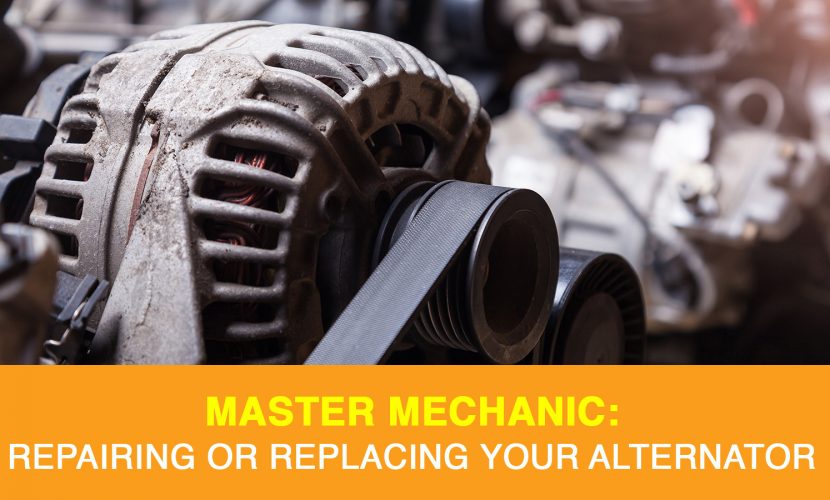
Master Mechanic: Repairing or Replacing Your Alternator
At Master Mechanic, we’ve repaired and replaced every part under the hood. You probably already know that a lot of equipment in modern vehicles relies on electricity to function. But, do you think your battery is what supplies all that power? Most people do!
In reality, the battery’s primary job is to start your car, but as you drive the alternator is actually what powers your car’s electrical systems and computers.
Today, we’ll look at how your alternator works, what function it serves, and how to recognize when it’s time for a repair or replacement.
How Does an Alternator Work?
The alternator is located on your vehicle’s engine. Although it’s not a very complicated component, it’s a very hard-working part that’s essential for keeping your car moving. The alternator is responsible for turning mechanical energy into electrical energy, which is used to power all electrical systems in the vehicle. This includes your headlights, cabin lights, radio, and more!
Alternators use a few common components to keep generating power:
Stator and Rotor: Several magnets located on the rotor spin quickly inside the stator. The stator also houses bundles of tightly wound copper wire that generate an alternating current as the magnets pass. This is where the name alternator comes from.
Diodes: Diodes are responsible for transforming the alternating current into a direct current. They also ensure that the electric current only flows from the alternator to the car battery–and never in reverse.
Voltage Regulator: Much like a surge protector, the voltage regulator is responsible for keeping the voltage level from exceeding its threshold.
Cooling Fan – Like any cooling fan, the one inside your alternator helps regulate temperature. Your cooling fan is designed to keep things cool under normal circumstances. If there’s a failing or broken part causing excessive friction, your alternator will overheat.
How Long Do Alternators Last?
A new alternator typically has a life of about seven years, or between 150,000 and 250,000 kilometres. That said, a lot of this depends on the quality of the alternator, how the car is driven/stored, and what devices you have connected. If you suspect your alternator may be on its last legs, or just want to make sure things are in working order, contact your local Master Mechanic today!
Signs Your Alternator Is Failing
A failing alternator is never fun to deal with, but they’re pretty easy to recognize early on–if you know what to look for! Being able to spot those signs early could mean the difference between a casual trip to your mechanic and being stuck on the side of the road unexpectedly.
Below are a few telltale signs that it’s time to repair or replace your alternator.
Delayed Starting or Dead Battery
If your car isn’t starting right away, your alternator may be worn out. When you start the car, your alternator is supposed to provide enough power to the spark plugs to ignite the gasoline in your engine and get things running. When the alternator is failing, there simply might not be enough power to keep the engine running or to start it smoothly.
It’s very common to see a dead battery caused by a broken alternator that’s not charging the cell completely. If your battery goes dead, make sure to check the alternator, too. If the alternator is to blame, you’ll need to fix it or you’ll just end up with another dead battery!
Dim Accessory Lights
If you’re driving your vehicle and notice that any of the interior or exterior lights are dim or flickering, it could indicate that your alternator isn’t generating enough power to support all the demand. Depending on the severity of the issue, you may even notice accessories and lights dim more as you accelerate.
Smell Burning Rubber?
If your alternator belt cannot rotate smoothly, it will create friction and cause the belt to heat up. If this happens for too long, you’ll smell burning rubber and could damage the belt. If you smell burning of any sort coming from your vehicle, don’t hesitate to contact your local Master Mechanic!
Grinding or Whining Noise
If you start to notice a grinding or whining noise coming from your alternator, that’s an obvious sign there’s an issue that needs attention. A dirty, broken, worn-out bearing is typically the cause of a grinding sound. If you’re hearing a whining noise, the voltage regulator could be telling the alternator to supply more power than needed.
—
If you need to replace your alternator, it’s important to go with trusted parts installed by a trusted mechanic. Different alternators carry a different warranty, so it’s best to check with your mechanic to see what is covered and avoid any surprises down the road.
If you suspect you may have an issue with your alternator, your battery, or any electrical system in your vehicle, don’t wait! Contact your local Master Mechanic today. We’re always happy to help!

